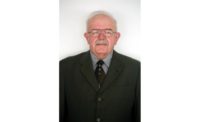With his service to the industry and collaborative efforts in government working with industry and academia, Dr. Lawrence Yates is especially deserving of the 2016 American Meat Science Association (AMSA) Special Recognition Award. The Special Recognition Award is sponsored by the American Meat Science Association (AMSA) and will be presented at the AMSA 69th Reciprocal Meat Conference on Tuesday, June 21, 2016 in San Angelo, TX.
A native of Richardson, Texas, Lawrence D. Yates received a Bachelor of Science degree in Biochemistry (1975) and a Master of Science degree in Animal Breeding (1975) from Texas A&M University. Lawrence subsequently enrolled at the University of Wisconsin-Madison where he received a Doctor of Philosophy degree in Meat and Animal Science (1982). Lawrence Yates’ background is one of depth and variety as he has held positions in all three areas of academics, industry and government. After graduation, he held academic appointments at the University of Washington (1982-1988) and then Oklahoma State University, Department of Animal Science (1988-1994). In 1994 he was hired as the Executive Director of the $8.9 million Nebraska Beef Council's check-off program until his departure in 1998 when he was hired by Red Oak Farms, Inc. as Vice President of Quality Control and Compliance from 1998 to 2000. Dr. Yates was then hired by the Department of Agriculture (USDA) in the Agricultural Marketing Service (AMS) where he has served with distinction up to the present. Lawrence has been primarily involved in and responsible for major Departmental initiatives in meat quality and carcass composition.
“Dr. Yates has worn many hats in the industry, university, beef council, industry and government, and he has truly made a difference in all areas that have affected virtually every aspect of the beef industry,” stated Glen Dolezal, AVP, Communication & Technology Development, Cargill.
Dr. Yates is recognized for his creative ability, scientific approach and statistical principles in the development, approval and implementation of the instrument assisted beef carcass grading program administered by the USDA. This program impacts everyone from the cattle producer all the way to the consumer in providing a more objective based scientifically validated approach to grading beef carcasses. Since much of the U.S. beef supply chain depends on official USDA grades to determine carcass value and to negotiate product pricing, the successful execution of a seamless transition to electronic beef grading systems has provided further confidence in an already highly regarded service provided by USDA that is more precise, accurate and uniform on a national basis.
Dr. Yates and his colleagues established performance standards to reflect a level of accuracy and consistency that improved upon the Department 's grading system and resulted in the approval of two computer-based electronic analysis instrument systems, after testing them at multiple locations to assess the predictive accuracy and to ensure the functionality relative to the entire U.S. beef carcass population. As a result of Dr. Yates efforts, a reduction of the variation in predicting ribeye size by 49 percent, USDA Yield Grade by 38 percent, and marbling by 27 percent was accomplished.
“Lawrence Yates' leadership in research, data analysis and requirements development demonstrated his ability to work collaboratively with industry, academia, instrument providers, other government bodies, and interested parties to carry out this important initiative to increase precision, accuracy and uniformity in the official grading of beef carcasses. The industry has embraced this move as a positive step in the marketing of beef through all segments of the supply chain,” stated Martin O’Connor, President, O’Connor Consulting and Management, LLC.
Lawrence Yates’ dedication to all segments of the industry has been exceptional and his contributions to research and innovations are in a league of their own. His work led to some of the most important initiatives in instruments assisted grading, making him a worthy recipient of the AMSA Special Recognition Award.
Source: AMSA



Report Abusive Comment